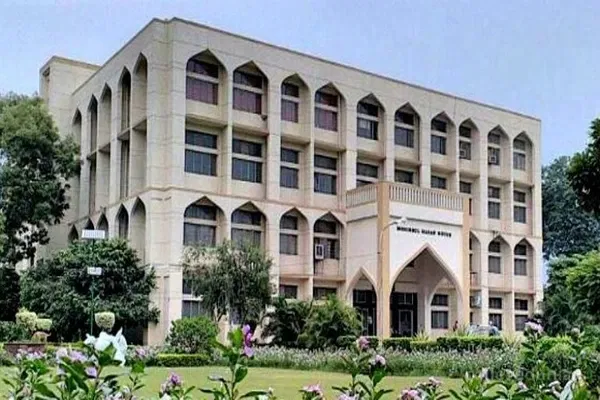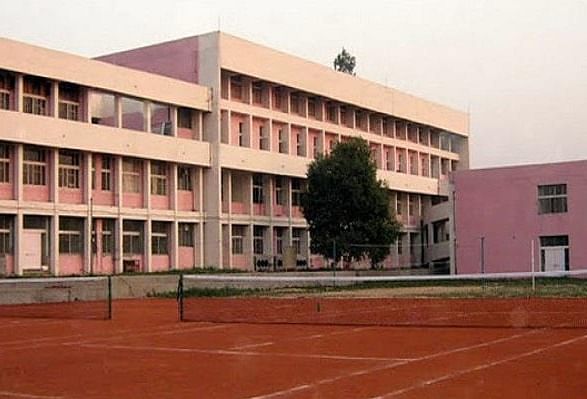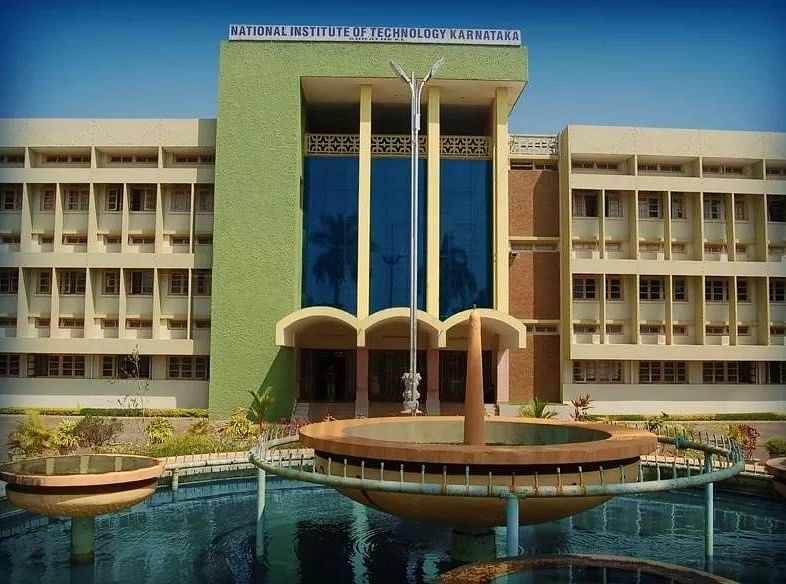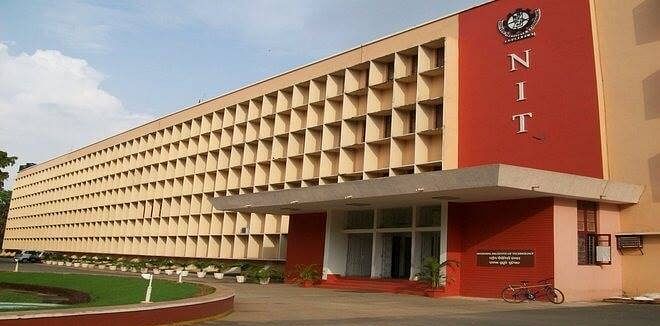M.Tech Thermal Engineering

M.Tech Thermal Engineering is a two-year-long full-time postgraduate course that deals with the movement of heat energy and heat transfer. The course involves real-time applications of fluid flow and heat transfer in Thermal Energy Systems, Cryogenic Engineering, and Refrigeration and Air Conditioning, etc. This course is well suited for students who are passionate about engineering and offers them ample opportunities in the thermal energy industry. Upon completing the course, students can work as Senior Thermal Engineer, Thermal Engineer, Design Engineer, Project Engineer, Assistant Professor, Research & Development Manager, Technical Specialist, Engineering Group Manager, etc.
Table of Contents
- About M.Tech Thermal Engineering
- Eligibility Criteria for M.Tech Thermal Engineering
- How To Get Admission in M.Tech Thermal Engineering?
- Popular Entrance Exams for M.Tech Thermal Engineering
- Top 10 M.Tech Thermal Engineering Colleges in India
- Fee Structure for M.Tech Thermal Engineering
- Syllabus and Subjects for M.Tech Thermal Engineering
- Why Choose M.Tech Thermal Engineering?
- Preparation Tips for M.Tech Thermal Engineering
- Scope For Higher Education
- Salary of a M.Tech Thermal Engineering Graduate
- Career Options After M.Tech Thermal Engineering
- Skills That Make You The Best M.Tech Thermal Engineering Graduate
M.Tech Thermal Engineering Course Details
| Degree | Masters |
| Full Form | Master of Technology in Thermal Engineering |
| Duration | 2 Years |
| Age | No specific age limit |
| Minimum Percentage | 50-60% |
| Average Fees | ₹20K - 2 LPA |
| Average Salary | INR 3- 9 LPA [Source: Payscale] |
| Employment Roles | Senior Thermal Engineer, Thermal Engineer, Design Engineer, Project Engineer, Assistant Professor, Research & Development Manager, Technical Specialist, Engineering Group Manager etc. |
| Top Recruiters | Tata Motors, General Electric Co, Cummins India Ltd, Robert Bosch, Mercedez Benz, Siemens Ltd, HCL Technologies Ltd, Cognizant Technology Solutions Corp, Whirlpool of India Ltd, Schindler etc. |
About M.Tech Thermal Engineering
M.Tech Thermal Engineering full form is Master of Technology in Thermal Engineering. It is a two-year postgraduate program designed to give students knowledge on advanced research-based thermal energy concepts. Thermal Engineering is a course in the technology spectrum that deals with the design, development, and simulation of new areas in Thermal Energy Systems and allied sciences. This course falls under the umbrella of M.Tech.
The course focuses on energy efficiency, renewable energy, and environmental preservation using the knowledge of classical energy technologies with new recent technologies in renewable energy, energy efficiency, energy-saving policies and means, environmental legislation, and energy economy. The course is further divided into various specializations that students can choose from.
Eligibility Criteria for M.Tech Thermal Engineering
M.Tech Thermal Engineering admission is offered to only those students who meet the eligibility requirements. The minimum M.Tech Thermal Engineering eligibility requirement is, students must have pursued an undergraduate degree in B.Tech/ BE in any relevant engineering stream with a minimum aggregate of 50% from a recognized Institute. There is no specific age limit for M.Tech in Thermal Engineering. Students should additionally pass the National Level entrance exam GATE or other entrance exams conducted by colleges for admission.
How To Get Admission in M.Tech Thermal Engineering?
For pursuing M.Tech in Thermal Engineering, students must ensure that they satisfy the eligibility criteria. While some colleges offer admission to the M.Tech Thermal Engineering program based on merit/marks obtained by students in the national level entrance exam GATE, other colleges conduct their entrance exam for testing the eligibility of students for admission. M.Tech in Thermal Engineering without GATE can be pursued from colleges that conduct their entrance exams or offer direct admissions. Applications for admissions may be availed both from the University website or by directly visiting the college's Admissions Office. The course is part of the M.Tech, and therefore, has a very similar admission process to other specializations.
Mentioned below are the details of the admission process in general:
How to Apply?
M.Tech Thermal Engineering course information for admissions can be found on the college's official websites in which the students want to apply. Admission registration can be carried out through online and offline methods. Students must visit the college campus for offline admissions, fill out the application form, collect the brochure, and submit all the required documents. For online applications, students should visit the college's admission website and fill out the application form. The submission of the application fees can be made via online money transfer or through cheques/demand drafts from the bank. On submission of the application form, students will receive further correspondence from the college.
Selection Process
The selection process for the M.Tech Thermal Engineering course in India is primarily based on the aspirant's GATE marks. Some colleges conduct their entrance exams for admission. Based on the merit obtained by the student in the qualifying exam or an entrance exam, the shortlisted candidates are called for the group discussion and personal interview rounds conducted by the colleges. Based on the overall marks obtained by the students, the eligible candidates are offered admission to the program. Admission is strictly offered to only those students who clear the minimum cut-off of the respective college and fulfill the eligibility requirements for M.Tech in Thermal Engineering. The admit card and other details regarding the exam are notified on the college website beforehand. The students are informed about the results through email communication or can visit the colleges' official website.
Read More on M.Tech Admission
Popular Entrance Exams for M.Tech Thermal Engineering
Some of the top colleges offering M.Tech in Thermal Engineering have an entrance exam-based admission process. The national level entrance exam GATE merit is considered in some colleges while others conduct their entrance exams. Some of the top M.Tech Thermal Engineering entrance examinations are:
A Quick Glance at the M.Tech Thermal Engineering Entrance Exams
Students who desire to opt for M.Tech in Thermal Engineering should study the exam pattern and syllabus well before time. This will help students in timely preparation for the entrance exams. In general, the most popular entrance exam, GATE, has the following pattern:
- Sixty-five questions carrying 100 marks, which are to be completed in 3 hours or 180 minutes.
- There are three sections, including General Aptitude, Engineering Mathematics, and Core Subjects.
- The Engineering Mathematics will carry around 15% of the total marks, the General Aptitude section will carry 15% of the total marks, and the remaining 70% of the total marks is devoted to the core subject of the paper.
- GATE would contain questions of two different types that are Multiple Choice Questions (MCQs) and Numerical Answer Questions.
Top 10 M.Tech Thermal Engineering Colleges in India
M.Tech Thermal Engineering colleges are located all across the country in different regions. Students can opt for the best college depending upon their merit and specialization needed. Some of the top M.Tech Thermal Engineering colleges in India are:
|
Sl. No. |
Name of the College |
|
1 |
|
|
2 |
|
|
3 |
|
|
4 |
|
|
5 |
|
|
6 |
|
|
7 |
|
|
8 |
|
|
9 |
|
|
10 |
Fee Structure for M.Tech Thermal Engineering
The M.Tech Thermal Engineering fees for various colleges in India is around INR 20,000 - 2 LPA. The course fees may vary based on the type of institute, location, infrastructure, faculties, and facilities available.
|
Sl. No. |
Name of the Institute |
Average Annual Fees |
|
1 |
Delhi Technological University, New Delhi |
INR 88,500 Per Annum |
|
2 |
Indian Institute of Science, Bangalore |
INR 26,600 Per Annum |
|
3 |
Birla Institute of Technology and Science, Pilani |
INR 4.30 LPA |
|
4 |
Anna University, Chennai |
INR 45,220 Per Annum |
|
5 |
Indian Institute of Technology, Kharagpur |
INR 60,000 Per Annum |
Syllabus and Subjects for M.Tech Thermal Engineering
M.Tech Thermal Engineering's duration is two years with four semesters. M.Tech Thermal Engineering syllabus is curated to include main lines of Thermal and Energetic Engineering focusing on energy efficiency, renewable energy, and environmental preservation. The syllabus is designed in a way to prepare students for the complex industrial thermal engineering systems. Many elective subjects are available for students to choose from depending upon their specialization and areas of interest. Some specializations available in thermal engineering are I.C. Engines, Hydro Turbomachines, Thermal Turbomachines, Heat Transfer and Thermal Power, Thermodynamics & Combustion Engineering, etc. Upon completing the course, students can become Senior Thermal Engineer, Thermal Engineer, Design Engineer, Project Engineer, Assistant Professor, Research & Development Manager, Technical Specialist, Engineering Group Manager, etc. Listed below are few core subjects in the course:
- Advanced Mathematics
- Modeling, Simulation & Computer Applications
- Advanced Fluid Mechanics
- Experimental Methods in Thermal Engineering
- Renewable Energy System
Read More about M.Tech Thermal Engineering Syllabus and Subjects
Why Choose M.Tech Thermal Engineering?
Students often wonder about M.Tech Thermal Engineering details before choosing the course. Before deciding on a career, students come across queries like, "What is M.Tech Thermal Engineering?" and "Why choose M.Tech in Thermal Engineering?”. To clearly understand answers to these questions, we have framed the following three pointers:
What is M.Tech Thermal Engineering All About?
M.Tech Thermal Engineering in India is a two-year-long postgraduate course that deals with an advanced understanding of theoretical and practical thermal energy and heat-related concepts. The course is well structured to make students valuable professionals for Engineering Equipment Industries, Nuclear Power Stations, Pollution Control Agencies, Space Research Organization, Oil Exploration and Refining, Thermal Power Stations, Energy Conservation industries, etc. The course equips students with knowledge of Hydro-Turbomachines, Thermal Energy, I.C. Engines, and heat transfer methods that are relevant for industries. The course is further divided into many specializations that students can choose from, depending on their subjects and areas of interest.
What Does a M.Tech Thermal Engineering Graduate Do?
M.Tech in Thermal Engineering offers a wide range of career options for graduates in both private and public organizations. Thermal engineers are crucial for the development of renewable energy sources and must allow the proper amount of energy to be transferred in components for the functioning of systems. Upon completing the course, students can work as Senior Thermal Engineer, Thermal Engineer, Design Engineer, Project Engineer, Assistant Professor, Research & Development Manager, Technical Specialist, Engineering Group Manager, etc. In addition, students can also opt for a teaching career in both govt. and private educational institutions.
Thermal Engineer: A thermal engineer will know about thermodynamics and the process to convert generated energy from thermal sources into chemical, mechanical, or electrical energy. Thermal engineers must have an understanding of economics and the components that they will be servicing or interacting with. Some components that a thermal engineer could work with include heat exchangers, heat sinks, bi-metals strips, radiators, and many more.
Reasons Why M.Tech Thermal Engineering Can Fetch You a Rewarding Career?
M.Tech Thermal Engineering can be a rewarding career for graduates as it offers ample opportunities in various sectors. Thermal engineers are responsible for many development services like energy technologies, transportation services, telecommunications, production, etc. Also, Thermal Engineering jobs are high-paying, and salaries rise with experience and expertise. This course opens up opportunities in various sectors like the automotive manufacturing industry, commercial construction, heating ventilation, and cooling industry, etc.
Career Scope and Options: Thermal Engineering degrees have the immense advantage of covering tens of specializations, making the field very flexible. With the depletion of non-renewable energy sources, there is an increasing demand for thermal engineers. Professionals in this career have many options available like teaching, research, consultants, etc.
Read More about M.Tech Thermal Engineering Jobs
Preparation Tips for M.Tech Thermal Engineering
Thermal Engineering M.Tech is an upcoming career option, and students should be well prepared before pursuing the course. Some of the important tips for students seeking admission in M.Tech in Thermal Engineering are:
Study about the Course: Do a detailed study of the course and its syllabus. Choose the best-suited career option and specialization for you.
Improvise Your Skills: For grabbing the best opportunities and good performance throughout the course, improve your mathematical and analytical skills. Also, enhance your communication and problem-solving skills.
Go for Internships: It will be beneficial for the students to go for internships and get real-time work experience.
Be Proficient: Students should have a proficiency in natural science and mathematics which is essential to become a thermal engineer.
Scope For Higher Education
M.Tech in Thermal Engineering is a master's degree that students pursue after a B.Tech degree. There are many specializations under M.Tech in Thermal Engineering that students can opt for. There are also certain higher study options available for graduate students after an M.Tech degree, which can help them in better understanding of the subject. Also, gaining more education can help the students make a career in research if they are interested in it. Listed below are some of the popular higher education options available for students:
- PhD in Thermal Engineering
- MBA
- Certificate Course in Engineering
- M.Phil
Salary of a M.Tech Thermal Engineering Graduate
The average salary for an M.Tech Thermal Engineering graduate is around INR 3-9 LPA (Source: PayScale), which would increase with the experience and skills. M.Tech Thermal Engineering graduates can work as professionals in many different private and government organizations. Some of the job roles for students can be Senior Thermal Engineer, Thermal Engineer, Design Engineer, Project Engineer, Assistant Professor, Research & Development Manager, Technical Specialist, Engineering Group Manager, etc. This course offers ample opportunities to students both in terms of job and higher education.
Read More on M.Tech Thermal Engineering Salary
Career Options After M.Tech Thermal Engineering
The M.Tech Thermal Engineering program will add to the qualifications of B.Tech. graduates, thus improving their chances of getting hired. M.Tech in Thermal Engineering graduates can go for jobs in both private and government tech-based organizations. A broad range of sectors opens up for thermal engineering graduates like the automotive manufacturing industry, commercial construction, heating ventilation, and cooling industry, etc. Students can also pursue higher studies or any other professional certificate courses. Some job roles offered to graduates are:
- Piping Designer
- Lecturer/Professor
- Researcher
- Trainee Planner
- Field Service Engineer
- Thermal Engineer
- Plant Chemist
- Graduate Trainee
- Maintenance Engineer
- Independent Consultant
- Project Manager
Skills That Make You The Best M.Tech Thermal Engineering Graduate
M.Tech Thermal Engineering graduates should develop good communication and problem-solving skills. They should be good at organizational skills and should be creative in bringing innovative ideas. A few necessary skills for M.Tech Thermal Engineering graduates are:
- Problem-Solving Skills
- Strong Analytical Skills
- Good Technical Skills
- Strong Mathematical Skills
- Planning Skills
- Strong Networking Skills
























